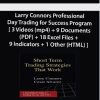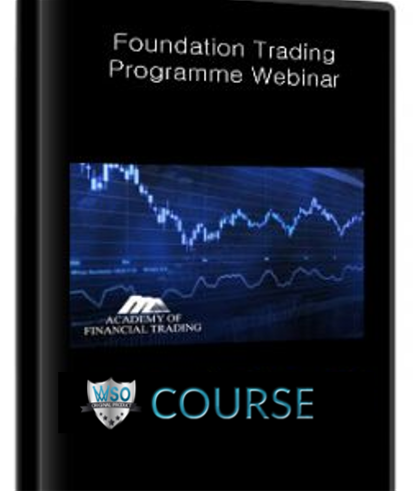Academy of Financial Trading: Foundation Trading Programme Webinar [ 11 Videos (Mp4)]
Rated 5.00 out of 5 based on 1 customer rating
1 review
$495.00 Original price was: $495.00.$47.00Current price is: $47.00.
SKU: CH - 0001907
Category: Forex & Trading
Tag: Academy of Financial Trading: Foundation Trading Programme Webinar [ 11 Videos (Mp4)]
Proof of item:
- Lesson 1:The Foundation of Your Foundation
a. Why Trade?
The old buy and hold style of trading which made the inexperienced look like trading “experts” up until the advent of the global crisis in 2008 aren`t working now, as many who bought and sat on bank shares would now agree. CFD`s offer the trader the opportunity to go short as well as long. With the current state of the global markets, there are a huge amount of both buying and selling opportunities that are discussed.
b. What to Trade?
Here we look at tradable instruments (forex, commodities, indices, individual stocks) and examine each individually to explain unique characteristics and inter-dependencies.
c. Who Else is Trading?
In almost all other areas of business and trade, participants like to have an understanding of who the other participants are. In trading most traders don`t consider and don`t know who else is trading and who the most dominant parties are. With this in mind new traders learn how to swim with the tide and avoid trading against the market movers. - Lesson 2: The Mechanics of Trading
What is leverage? What are the benefits and risks associated with it? Here we will have a frank examination of leverage, how it makes the markets accessible to most and how to use it to our advantage. This is an area often overlooked and is especially important in times of high global market volatility. In short, without leverage most typical traders would not be able to physically trade. Whilst leverage gives individuals the opportunity to profit by giving them access to financial trading, it is also has an ever present risk. Inexperienced traders need to understand how to get leverage to work for them. All of the unnecessary jargon is also simplified and clear demonstrations are provided to work out trade sizes and individual trade risk relevant to markets being traded.
- Lesson 3: Candlesticks – Shedding Light on Opportunities
Technical Analysis is all about seeing, accepting and trading. This is trading what is in front of you not what you or a pundit predicts. An introduction to price action, reading candlestick charts, dojis, engulfing pattern formations and counter retail trading are covered in this valuable lesson.
- Lesson 4: Technical Charting 101 – Building Your Trading Toolkit
The previous lesson is expanded to develop technical channel and trend trading techniques highlighting breakouts, support and resistance, with counter retail strategic entry and exit techniques for each trade made. Building on the previous technical lessons this session focuses on descending/ascending triangles, volatile measuring indicators, oscillators and Fibonacci retracements with a particular emphasis on counter-retail trading techniques that both avoid making and exploit the mistakes that typical retail traders make – all very much opportunity focussed.
- Lesson 5: Trading Platform Software + Demo
On this lesson we show students not only how to download and install a trading platform, but also spend the lesson demonstrating how to use it. This allows the students to practise their trading techniques and strategies with a demo account before investing any real capital. This also allows students to familiarise themselves with how the markets react to certain actions, seeing charts move in real time, and how trades are processed in real time.
- Lesson 6: Becoming a Counter Retail Trader
This lesson brings together all of the previous Technical Analysis lessons focussing on some very straightforward methods of finding Counter Retail Trading Opportunities – our speciality. Some of the methods include an examination of moving averages, cross -overs, simple, exponential and correct order MAs – all focussed on attempting to find that confirmation to trade that we need. This lesson is always one of the best received and is not to be missed.
- Lesson 7: Psychology of Real World Trading
There is no room for emotion or surprises in trading. Any trade entry or exit is pre-planned and logged in your trader`s journal. The reason you entered or exited a trade needs to have been planned in advance. If you make some winning trades and don`t know why, your capital is at risk! Real life explanations and examples of the difficulties which real traders face each day are discussed. Practical steps are illustrated to reduce the psychological difficulties faced by real traders. This is best done through an understanding of why these issues arose in the first place. With emotions in check, every profitable trader needs numeric trading targets and goals with a realistic plan that fits their lifestyle. Good and bad results are all part of the plan and if constructed correctly there should be no such thing as a bad trade.
- Lesson 8: Risk Management – Protecting Your Capital
Trading like all other forms of investing carries risk. It is through that very risk that profits may flow. An understanding of the interconnected and inseparable nature of risk and return is fundamental to profitable trading. Here we will introduce traders to the concepts of risk management so they can minimise their losing trades and maximise their winners in a premeditated format.
1 review for Academy of Financial Trading: Foundation Trading Programme Webinar [ 11 Videos (Mp4)]
5.0
Based on 1 review
| 5 star | 100 | 100% |
| 4 star | 0% | |
| 3 star | 0% | |
| 2 star | 0% | |
| 1 star | 0% |
1-1 of 1 review
Sorry, no reviews match your current selections
Add a review
Currently, we are not accepting new reviews
Q & A
Ask a question
There are no questions yet
Related products
Sale!
Rated 5.00 out of 5
Forex & Trading
Rated 5.00 out of 5
$14.00
Sale!
Forex & Trading
Rated 5.00 out of 5
Forex & Trading
Rated 5.00 out of 5
$9.00
Sale!
Forex & Trading
Rated 5.00 out of 5
Sale!
Forex & Trading
Rated 5.00 out of 5
Sale!
Forex & Trading
Rated 5.00 out of 5
Sale!
Forex & Trading
Rated 5.00 out of 5














Quick delivery; just as described; great vendor | Academy of Financial Trading: Foundation Trading Programme Webinar [ 11 Videos (Mp4)]